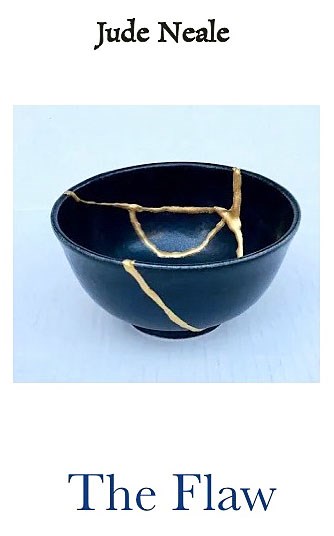Let’s start at the end. Let’s start with the line “. . . this is the time to reach out / and grab the scruff of the universe . . .” because to grab the scruff of the universe is an absolutely brilliant line.
These words are from all is hazy, the last poem in Jude Neale’s new powerhouse of poetry, The Flaw (Ekstasis Editions, Victoria, BC). Words such as these must be shared and shared again. And so it goes with every page of The Flaw, Jude Neale’s 11th collection of poetry.
Let’s start in the middle with the laugh-out-loud: “To my brother on his birthday—I wish you dog pee on the carpet / and old eggs with pale yolks . . .” because. Because, because, because.
Let’s start The Flaw at its essence, “Choose Love” (How do you pack your life). Because love strides, limps, heaves, and courses through every one of Jude’s poems. Be it fierce. Or gentle. Outrageous or protective. Strong or weak. Or flawed.
What was Taken is limned with tattered love. Protective instincts weep for the child and revolt against the perpetrator “whose rough hands . . . nudged her knees apart like a broken needle . . .”
You Hold the Mirror, “an anthem of apology,” is heartbreaking. For the travesties against Indigenous children, Jude offers the words: “Your children are mine. / I rock emptiness back and forth. / This is an ache / we must learn from, / nestled like a pit in furrowed soil.”
As you may have gathered, I don’t read a book of poetry from beginning to end, but randomly open it to any page. I like the adventure, the not-knowing. And, often, the synchronicity: I first opened The Flaw to Why Is It Always An Insult To Be Just Like Your Mum.
I had just visited my 96-year-old mother in long-term care. I cried while reading. On and off, for hours. It was one of those days as the daughter of a long-term care resident with dementia. But tears help heal. As does poetry like Jude Neale’s.
I expected to find similar synchronicity when I happened upon Grandma’s Kitchen. The title conjures memories. In the first two lines, I was off and away, tilting into my grandmother’s kitchen, the smells, the warmth, the food.
And then — I wasn’t. How, I asked myself, did we go from nurturing comfort and sustenance to “. . . helping singe her split ends . . .” ? You will have to read the poem to find out!
But herein lies another aspect to Jude’s powerful writing: She is a magnificent storyteller. Jude has honed her craft and will deftly guide you through each poem. Sometimes for only a glimpse of the landscape. Sometimes with detours into the unknown. But always with signposts along the way.
Her writing invites you in; it doesn’t keep you out. It is accessible. Each poem is an adventure in discovery, yet even in her most intricate poems, I was never left abandoned to navigate an esoteric maze.
There is no better example of Jude’s prowess as a poetic storyteller than The One That Got Away. What begins with a fishing trip with her dad as little Jude jumps up and down in the rowboat, ends with: “I saved his pipe and his teeth.”
I cannot tell you what happened in between. That would ruin the story.
The Flaw can be found online at http://www.ekstasiseditions.com/



